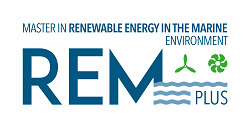Pathways
Students will spend their 1st semester in UCC (30 ECTS), the 2nd semester in UPV/EHU (30 ECTS) and the 3rd semester in ECN or NTNU (30 ECTS). The 4th semester will be devoted to the student’s Master thesis, hosted by any of the above mentioned universities or in the associate centers collaborating in this master.
In order to allow any student to choose among the optative offer (20,5 ECTS) corresponding to the first and second semesters, as will be shown next, a minimum number of 15 ECTS will be needed from any of the two specific specialization modules to be recognized as is, with the only condition of accounting a total amount of 30 ECTS per semester (including compulsory and optative subjects). No specialization module will be recognized to those students not addressing this minimum requirement. In this sense, the advice of the student’s supervisor is crucial.
The diagram alongside illustrates this.

On the next tables the global statistics, regarding distribution of ECTS by module, specialization and university is shown, according to the priorities:
| a) ECTS Distribution by Module | ECTS (*) | |
| TOTAL | ||
| 1 | Resource and marine environment | 8.5 |
| 2 | Theoretical foundations: early marine energy conversion | 49.5 |
| 3 | Conversion technologies | 25 |
| 4 | Connection and integration into the electricity grid | 29 |
| 5 | Engineering, development and management of offshore parks | 20 |
| 6 | Environmental, economic and legal aspects of marine renewable energy | 10 |
| 7 | Local culture | 5 |
| LECTURES: | 147 | |
| 8 | Master Thesis | 30 |
| TOTAL MASTER: | 177 | |
(*) Considering the total offer of subjects by all the partner universities.
Table 1. REM distribution of ECTS by module.
On the next table the global distribution of ECTS by module and specialization is shown, according to the priorities:
| b) ECTS Distribution by Module and Specialization | ECTS (*) | ||
| (A) | (B) (**) | ||
| 1 | Resource and marine environment | 8.5 | 4.5 |
| 2 | Theoretical foundations: early marine energy conversion | 29.5 | 20 |
| 3 | Conversion technologies | 10 | 25 |
| 4 | Connection and integration into the electricity grid | 6 | 29 |
| 5 | Engineering, development and management of offshore parks | 21 | 6 |
| 6 | Environmental, economic and legal aspects of marine renewable energy | 10 | 10 |
| 7 | Local culture | 5 | 3 |
| LECTURES: | 90 | 97.5 | |
| 8 | Master Thesis | 30 | 30 |
| TOTAL MASTER: | 120 | 127.5 | |
(**) Offer including all the optional subjects; students at NTNU must choose a specified combination of such optionals, completing 30 ECTS of lectures.
Table 2. REM distribution of ECTS by module and specialization.
Finally, a detailed distribution of ECTS by module, specialization and university is shown below:
| c) ECTS Distribution by Module, Specialization and Partner | ECN | UPV-EHU | UCC | NTNU (**) | |||
| (A) | (A) | (B) | (A) | (B) | (B) | ||
| 1 | Resource and marine environment | 4 | 4.5 | 4.5 | 0 | 0 | 0 |
| 2 | Theoretical foundations: early marine energy conversion | 14 | 10.5 | 7.5 | 5 | 5 | 7.5 |
| 3 | Conversion technologies | 5 | 0 | 0 | 5 | 10 | 15 |
| 4 | Connection and integration into the electricity grid | 0 | 6 | 9 | 0 | 5 | 15 |
| 5 | Engineering, development and management of offshore parks | 6 | 6 | 6 | 10 | 0 | 0 |
| 6 | Environmental, economic and legal aspects of marine renewable energy | 0 | 0 | 0 | 10 | 10 | 0 |
| 7 | Local culture | 2 | 3 | 3 | 0 | 0 | 0 |
| LECTURES: | 30 | 30 | 30 | 30 | 30 | 37.5 | |
| 8 | Master Thesis | 30 | 30 | 30 | 30 | ||
| TOTAL MASTER: | 60 | 60 | 60 | 67.5 | |||
Table 3. REM distribution of ECTS by module, specialization and university.
[last update = 04/27/2022]
